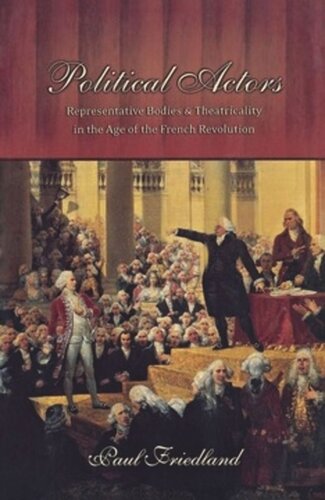

Most ebook files are in PDF format, so you can easily read them using various software such as Foxit Reader or directly on the Google Chrome browser.
Some ebook files are released by publishers in other formats such as .awz, .mobi, .epub, .fb2, etc. You may need to install specific software to read these formats on mobile/PC, such as Calibre.
Please read the tutorial at this link: https://ebookbell.com/faq
We offer FREE conversion to the popular formats you request; however, this may take some time. Therefore, right after payment, please email us, and we will try to provide the service as quickly as possible.
For some exceptional file formats or broken links (if any), please refrain from opening any disputes. Instead, email us first, and we will try to assist within a maximum of 6 hours.
EbookBell Team

4.3
48 reviewsFrom the start of the French Revolution, contemporary observers were struck by the overwhelming theatricality of political events. Examples of convergence between theater and politics included the election of dramatic actors to powerful political and military positions and reports that deputies to the National Assembly were taking acting lessons and planting paid "claqueurs" in the audience to applaud their employers on demand. Meanwhile, in a mock national assembly that gathered in an enormous circus pavilion in the center of Paris, spectators paid for the privilege of acting the role of political representatives for a day.Paul Friedland argues that politics and theater became virtually indistinguishable during the Revolutionary period because of a parallel evolution in the theories of theatrical and political representation. Prior to the mid-eighteenth century, actors on political and theatrical stages saw their task as embodying a fictional entity—in one case a character in a play, in the other, the corpus mysticum of the French nation. Friedland details the significant ways in which after 1750 the work of both was redefined. Dramatic actors were coached to portray their parts abstractly, in a manner that seemed realistic to the audience. With the creation of the National Assembly, abstract representation also triumphed in the political arena. In a break from the past, this legislature did not claim to be the nation, but rather to speak on its behalf. According to Friedland, this new form of representation brought about a sharp demarcation between actors—on both stages—and their audience, one that relegated spectators to the role of passive observers of a performance that was given for their benefit but without their direct participation. Political Actors, a landmark contribution to eighteenth-century studies, furthers understanding not only of the French Revolution but also of the very nature of modern representative democracy.